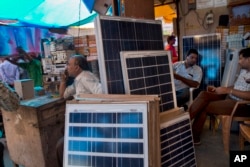In a major boost to global efforts to address climate change, India — the world’s third-largest emitter of greenhouse gases — ratified the landmark Paris climate pact Sunday.
India’s formal agreement brings the accord closer to coming into force. It is to take effect after 55 countries producing 55 percent of the world’s emissions ratify it.
With India's signature, 62 countries accounting for more than half the world’s emissions would have come onboard.
The European Union has said it will ratify the pact next week. The United States and China did so last month.
India’s ratification is significant. Although the country of 1.2 billion people accounts for about four percent of worldwide emissions, it is poised for a "quantum leap" in energy generation to fuel its fast-growing economy.
The Paris pact aims to limit global warming to below two degrees Celsius compared to pre-industrial times by ushering in a radical shift away from the world’s reliance on fossil fuels.
India ratified the deal on the birth anniversary of its independence leader, Mohandas Karamchand Gandhi, calling him an example of how to live with a low carbon footprint.
In a reference to developed countries, Environment Minister Anil Madhav Dave said profound lifestyle changes would be necessary to reduce pressure on the world’s resources. “We want to say loud and clear that the Indian way of life, the Gandhian way of life, unless that lifestyle is adopted, we can have seminars and negotiations, but little will be achieved,” Dave said a day before India signed the pact.
India has always argued that its per capita contribution to greenhouse gas emissions is a fraction of that of developed countries.
The minister also said India will seek a clear roadmap relating to finance and technology transfers at future climate change talks. Rich countries have pledged $100 billion a year in climate finance for developing countries by 2020, but so far concrete commitments amount to a fraction of that sum.
India has promised to slash the intensity of its fossil-fuel emissions — a measure of pollution released per unit of economic growth — by one-third by 2030 compared to 2005 levels.
It plans to achieve that by making a massive shift to renewables, generating 40 percent of the power from clean energy sources by 2030. Much of this will come from solar in the sun-drenched country, which so far relies heavily on polluting coal for power generation.
India was initially reluctant to join a global climate pact arguing that it cannot end its reliance on cheap coal to meet its growing energy needs. It points out that one-third of its population is still not connected to the grid and it needs to improve the standard of living of millions still struggling in poverty.
But New Delhi changed its position last year and signaled that it is ready to combat climate change with the rest of the world.
The road ahead in climate negotiations, however, is not going to be easy. Minister Dave said at talks on phasing out a potent group of gases called hydrofluorocarbons, the country will ensure “that development of India must not get compromised. That we must get enough time."
Nitin Pandit, the head of the Indian arm of research organization World Resources Institute, said India is making earnest attempts to enable renewable energy to play a big part in its energy mix through new policies to encourage investment in clean energy.
“To integrate renewables into the grid is not child’s play” says Pandit.
He says there is pressure to act. “I do believe the overall public and politics at large in India and perhaps in many other countries is seeing the impact of climate change. They are right there to see. And if they don’t do anything, nature has a way of telling society what is going on,” says Pandit.
A small town in Rajasthan state this summer broke India’s previous record for the highest temperature, when the mercury in Phalodi town touched 51 degrees Celsius.











